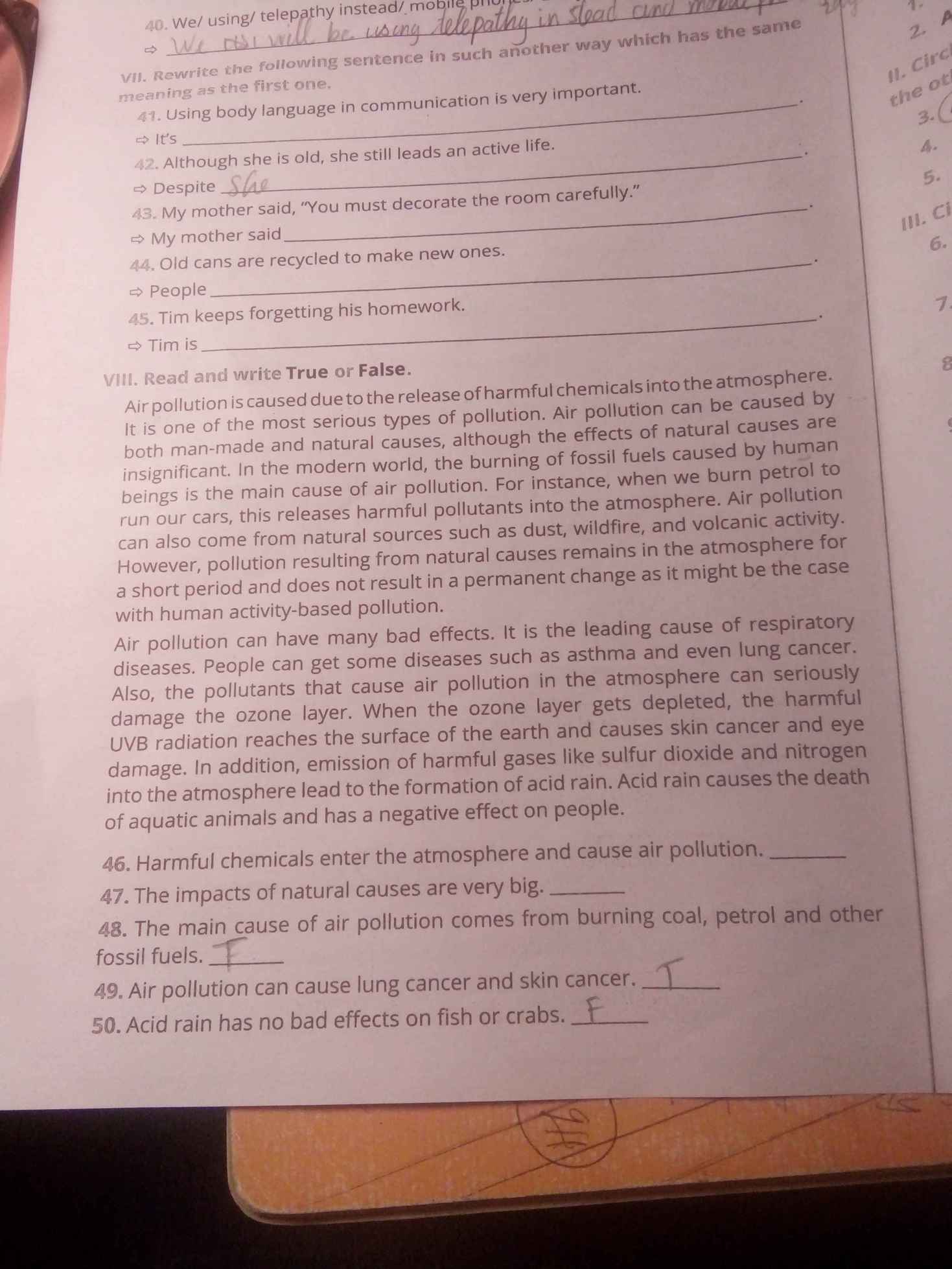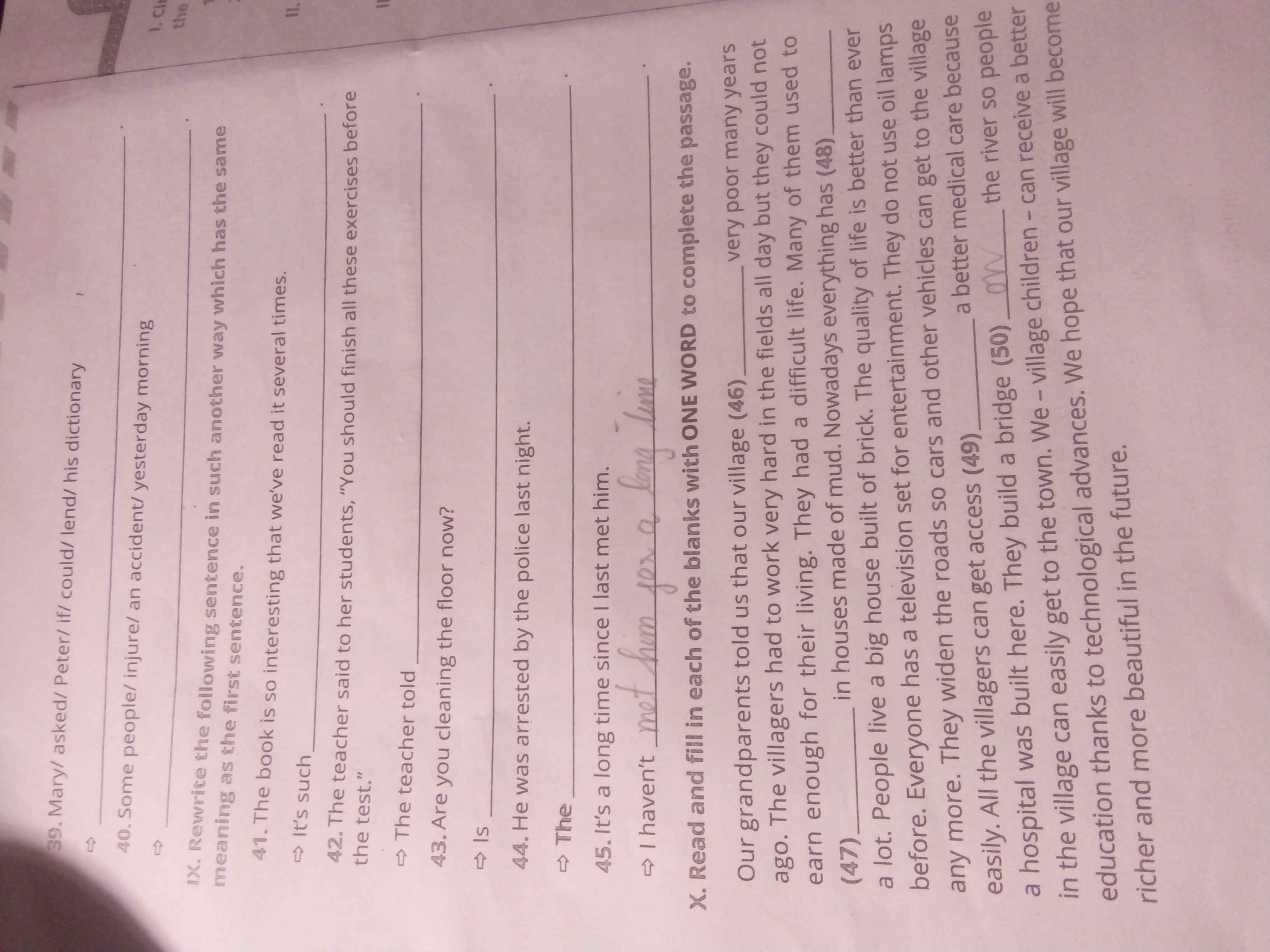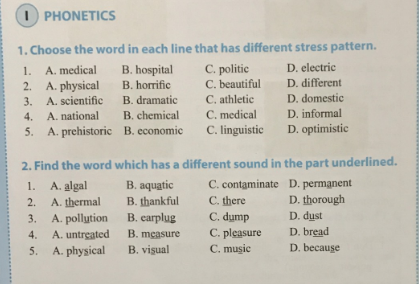Hãy nhập câu hỏi của bạn vào đây, nếu là tài khoản VIP, bạn sẽ được ưu tiên trả lời.

Want to learn better English 8, needs to investigate more words in the dictionary he Vietnam. The school in the dictionary helps us in many vocabularies, learn many new words. Also, the help of reading have the knowledge to do the questions in English, helps us have better communication skills. Collective listening, speaking, reading and writing to do well as much more. Go online to help us investigate the things that we do not know, the information that we do not know will be answered.

The Tay, with local groups Pa dí, Thổ, Ngan, Phén, Thu Lao, is an ethnic group of 54 ethnic groups in Viet Nam. Tay people speak Tay, a Tai dialect of the Tai-Kadai language. Tay people live mainly in lowland areas of northern Vietnam. The Tay was previously known as the Tho (although this name is now used to refer to a different ethnic group, see Turks). Tay people have the second largest population in Vietnam. Tay people, Nung have a close relationship with the Choang people in China.Tay people mainly reside in the northern midland and mountainous provinces (1,400,519 people in 1999). In addition, in the recent time, the Tay also migrated to some provinces in the Central Highlands like Dak Lak and Lam Dong.The Tay are usually at the foot of the mountain or along the stream. The name is often referred to by the name of hills, fields, rivers. Each village has 15 to 20 houses. Large villages divided into many small villages.Tay dressed in indigo. Traditional Tay costumes are made from self-made cotton yarn, dyed indigo on men's and women's clothes, almost without decorative pattern. Tay clothing can be considered one of the simplest outfits of 54 ethnic groups. The costume is simple but meaningful.Then singing, singing, singing sli are used in various activities, popular folk songs of the Tay. Musical instruments such as the Micro, Shake. Chess is an instrument that is present in all spiritual activities of the Tay, such as soul in the folk dance of the Tay. In this life, the sex acts as a means of communicating bold identity.Traditional houses are usually on stilts, lands and roofs with grass and some border areas have defense types. In the house to distinguish male rooms outside, women in the chamber. Most popular are 3-room, 2-roofed houses (no chop), logs of land or bushes, surrounding woods, roofs of grass, picturesque Tay people settle in groups of about 15 to 20 households. Tay people worship ancestors and animals. The Tay ancestors' altar is placed in the middle of the house and made into a private space and revered. Pregnant women and their newborns are not allowed to sit or lie on chairs or beds in front of the altar. In the Tay religion, the most important feast day of the Tay people is usually the last day of the lunar month.The life of the Tay is often associated with nature, so the food and foodstuff of the Tay people are products obtained from production activities in areas with forests, rivers, streams and hills surrounding. Some famous dishes are: sticky egg rolls, sticky rice balls, sour bamboo shoots, stigma.
The Tay, with local groups Pa dí, Thổ, Ngan, Phén, Thu Lao, is an ethnic group of 54 ethnic groups in Viet Nam. Tay people speak Tay, a Tai dialect of the Tai-Kadai language. Tay people live mainly in lowland areas of northern Vietnam. The Tay was previously known as the Tho (although this name is now used to refer to a different ethnic group, see Turks). Tay people have the second largest population in Vietnam. Tay people, Nung have a close relationship with the Choang people in China.Tay people mainly reside in the northern midland and mountainous provinces (1,400,519 people in 1999). In addition, in the recent time, the Tay also migrated to some provinces in the Central Highlands like Dak Lak and Lam Dong.The Tay are usually at the foot of the mountain or along the stream. The name is often referred to by the name of hills, fields, rivers. Each village has 15 to 20 houses. Large villages divided into many small villages.Tay dressed in indigo. Traditional Tay costumes are made from self-made cotton yarn, dyed indigo on men's and women's clothes, almost without decorative pattern. Tay clothing can be considered one of the simplest outfits of 54 ethnic groups. The costume is simple but meaningful.Then singing, singing, singing sli are used in various activities, popular folk songs of the Tay. Musical instruments such as the Micro, Shake. Chess is an instrument that is present in all spiritual activities of the Tay, such as soul in the folk dance of the Tay. In this life, the sex acts as a means of communicating bold identity.Traditional houses are usually on stilts, lands and roofs with grass and some border areas have defense types. In the house to distinguish male rooms outside, women in the chamber. Most popular are 3-room, 2-roofed houses (no chop), logs of land or bushes, surrounding woods, roofs of grass, picturesque Tay people settle in groups of about 15 to 20 households. Tay people worship ancestors and animals. The Tay ancestors' altar is placed in the middle of the house and made into a private space and revered. Pregnant women and their newborns are not allowed to sit or lie on chairs or beds in front of the altar. In the Tay religion, the most important feast day of the Tay people is usually the last day of the lunar month.The life of the Tay is often associated with nature, so the food and foodstuff of the Tay people are products obtained from production activities in areas with forests, rivers, streams and hills surrounding. Some famous dishes are: sticky egg rolls, sticky rice balls, sour bamboo shoots, stigma.
THAM KHẢO

My pop idol is Justin bieber. He is a Canadian singer and songwriter. After a talent manager discovered him through his YouTube videos covering songs in 2008 and signed to RBMG, Bieber released his debut EP, My World, in late 2009. He has a lot of fans. Some typical songs of him are What Do You Mean, Sorry, and so on. I admin him so much, I want to become a good singer like him.

How often do you learn English?
=> I have it four times a week.
2. When did you start learning English?
=> I have learnt it for 5 years.
3. What is your favourite subject?
I love Biology.
4. Why do you Biology?
Because it's very insteresting subject.
5. Do you Maths?
No, I don't.
Học tốt~♤
Trước tiên, để hỏi những thông tin cơ bản nhất về chủ đề học tập là trường, lớp một ai đó đang theo học, bạn có thể sử dụng các mẫu câu sau:
- What school are you in?
/ wʌt skul ɑr ju ɪn /
- Which school are you in?
/ wɪʧ skul ɑr ju ɪn /
- What school do you attend?
/ wʌt skul du ju əˈtɛnd /
- What school do you go to?
/ wʌt skul du ju goʊ tu /
Các câu hỏi trên đều có chung nghĩa: Bạn đang học ở trường nào?/Đâu là ngôi trường bạn đang theo học?. Như bạn thấy, bạn có thể sử dụng cụm “What school” hoặc “Which school” để hỏi, và có thể dùng một trong các cụm “are you in”, động từ “go to” hoặc “attend” để diễn đạt ý nghĩa đang theo học, đang học tại một ngôi trường nào đó.
Tuy nhiên, cũng có một sự khác biệt nhỏ giữa trường hợp sử dụng “What” và “Which”. “Which” thường được dùng khi bạn có một danh sách, hoặc một tập hợp đối tượng để người được hỏi có thể lựa chọn từ danh sách, tập hợp đó. Ví dụ, các bạn đang nói chuyện về một nhóm các ngôi trường ở cùng một thành phố A. Khi bạn hỏi một người bạn: “Which school do you go to?”, nghĩa là bạn ấy sẽ cho bạn biết mình đang theo học trường nào trong số các ngôi trường nằm ở thành phố A kia.
Thay vào đó, “What” sẽ được sử dụng khi đối tượng các bạn đang nói đến mang tính khái quát, phạm vi rộng hơn, có thể là bất cứ trường nào chứ không bó hẹp trong một danh sách, tập hợp cụ thể nào cả. Cách hỏi này cũng sẽ mang tính chung hơn. Khi hỏi một người “What school are you in?”, có thể bạn ấy sẽ không nói tên cụ thể của ngôi trường mình học mà chỉ mô tả chung đó là business school (trường dạy kinh doanh), medical school (trường y), v.v.
Ngoài ra, có một lưu ý nhỏ khác về sự khác nhau giữa tiếng Anh – Anh và Anh – Mỹ về nghĩa của từ “school”. Trong tiếng Anh – Mỹ, “school” có ý chỉ tất cả các cấp học, từ mẫu giáo, trung học đến cao đẳng, đại học. Nhưng trong tiếng Anh – Anh, “school” chỉ bao hàm cấp học tiểu học, trung học chứ không bao gồm giáo dục cao đẳng, đại học. Cao đẳng, đại học sẽ được chỉ rõ là “college” và “university”. Do đó, tùy vào tình huống, ngữ cảnh và loại ngôn ngữ sử dụng, bạn hãy sử dụng đúng từ nhé.
Bên cạnh việc hỏi tên trường, bạn có thể hỏi thêm những thông tin, cảm nhận khác liên quan đến trường, lớp của đối phương, ví dụ như:
- Do you think your college is a good school? (Bạn có thấy trường cao đẳng của mình là một trường học tốt không?)
/ duː juː θɪŋk jɔː ˈkɒlɪʤ ɪz ə gʊd skuːl /
- Did you enjoy going to high school? (Bạn có thích/tận hưởng quãng thời gian cấp 3 của mình không?)
/ dɪd ju ɛnˈʤɔɪ ˈgoʊɪŋ tu haɪ skul /
- How many students does your school have? (Trường bạn có bao nhiêu học sinh?)
/ haʊ ˈmɛni ˈstudənts dʌz jʊər skul hæv /
- What do you remember about your teachers? (Bạn có nhớ gì/có kỉ niệm gì về giáo viên của mình không?)
/ wʌt du ju rɪˈmɛmbər əˈbaʊt jʊər ˈtiʧərz /
- Who is your favorite teacher? (Ai là giáo viên ưa thích ở trường của bạn?)
/ hu ɪz jʊər ˈfeɪvərɪt ˈtiʧər /
- Do you have any teachers you don’t ? (Có giáo viên nào bạn không thích không?)
/ du ju hæv ˈɛni ˈtiʧərz ju doʊnt laɪk /
2 Cách hỏi về ngành học, môn họcKhi nói chuyện, hỏi thông tin một sinh viên cao đẳng, đại học (hoặc người đã tốt nghiệp), ta thường quan tâm đến “major” – chuyên ngành học của họ. Các chuyên ngành khác nhau có chương trình học, tính chất rất khác nhau, đào tạo chuyên môn khác nhau và dẫn đến những nghề nghiệp khác nhau. Bạn có thể sử dụng các mẫu câu sau để hỏi về chuyên ngành học của bạn mình nhé:
- What do you study? (Bạn học về cái gì/lĩnh vực gì/chuyên ngành nào?)
/ wʌt du ju ˈstʌdi /
- What is your major? (Chuyên ngành của bạn là gì?)
/ wʌt ɪz jʊər ˈmeɪʤər /
- What are you majoring in? (Bạn đang theo học chuyên ngành gì?)
/ wʌt ɑr ju ˈmeɪʤərɪŋ ɪn /
- What did you major in at university? (Bạn đã theo học chuyên ngành gì ở đại học?)
/ wʌt dɪd ju ˈmeɪʤər ɪn æt ˌjunəˈvɜrsəti /
- Why did you choose the major you did? (Vì sao bạn lại lựa chọn chuyên ngành đó?)
/ waɪ dɪd ju ʧuz ðə ˈmeɪʤər ju dɪd /
Đi vào chi tiết, cụ thể hơn, ta có thể đi vào các môn học – “subject”, “class”. Có một số chủ đề các bạn có thể chia sẻ cùng nhau: những môn phải học, môn sở trường, sở đoản, môn học ưa thích, v.v. Dưới đây mình có đưa ra một số các mẫu câu thường gặp mà bạn có thể tham khảo:
- What subjects are you good at? (Bạn học giỏi những môn học nào?)
/ wʌt ˈsʌbʤɪkts ɑr ju gʊd æt /
- What subjects were you bad at? (Bạn học kém những môn học nào?)
/ wʌt ˈsʌbʤɪkts wɜr ju bæd æt /
- What is your favorite class? (Đâu là lớp học/môn học yêu thích của bạn?)
/ wʌt ɪz jʊər ˈfeɪvərɪt klæs /
- What is your favorite subject? (Môn học yêu thích của bạn là môn nào?)
/ wʌt ɪz jʊər ˈfeɪvərɪt ˈsʌbʤɪkt /
- Why do you it? (Vì sao bạn thích môn học đó?)
/ waɪ du ju laɪk ɪt /
- Do you study any foreign language in school? (Bạn có học thêm ngoại ngữ nào ở trường không?)
/ du ju ˈstʌdi ˈɛni ˈfɔrən ˈlæŋgwəʤ ɪn skul /
- What classes do you need to take? (Bạn phải học những môn nào/tham gia những lớp học nào thế?)
/ wʌt ˈklæsəz du ju nid tu teɪk /
3 Cách hỏi về thói quen, cuộc sống học tậpNếu như những thông tin về trường học, chuyên ngành, môn học là những thông tin khá “basic”, “mẫu mực”, thì thói quen, cuộc sống, phương pháp học tập là chủ đề rất mở, không có giới hạn, và đây thường là chủ đề mà các bạn có thể “huyên thuyên” cùng nhau hoài không dứt. Có đến cả tỉ thứ bạn có thể chia sẻ cùng mọi người: giờ giấc đi học, trang phục mỗi ngày, đến trường bằng xe hai bánh hay “hai cẳng”, trải nghiệm những lần “bùng” học, ăn quà trong lớp, ôn thi…, và thường những câu chuyện nhỏ này sẽ giúp các bạn quen, thân nhau nhanh hơn rất nhiều đó!
Trong trường hợp vẫn chưa nghĩ ra chuyện gì để hỏi, bạn hãy thử những câu hỏi này xem:
- Do you paripate in any extracurricular activities at university? (Bạn có tham gia hoạt động ngoại khóa nào ở trường đại học không?)
/ du ju pɑrˈtɪsəˌpeɪt ɪn ˈɛni ˌɛkstrəkəˈrɪkjələr ækˈtɪvətiz æt ˌjunəˈvɜrsəti /
- Do you feel that it is harder to study at university than in high school? (Bạn có cảm thấy việc học ở đại học khó hơn ở cấp 3 không?)
/ du ju fil ðæt ɪt ɪz ˈhɑrdər tu ˈstʌdi æt ˌjunəˈvɜrsəti ðæn ɪn haɪ skul /
- Do you to study in small classes or big classes? (Bạn thích học trong những lớp học quy mô nhỏ hay quy mô lớn (về số lượng sinh viên)?)
/ du ju laɪk tu ˈstʌdi ɪn smɔl ˈklæsəz ɔr bɪg ˈklæsəz /
- Are you living in the university’s dormitory? (Bạn có đang sống trong kí túc xá của trường không?)
/ ɑr ju ˈlɪvɪŋ ɪn ðə ˌjunəˈvɜrsətiz ˈdɔrməˌtɔri /
- How is your life in the dormitory? (Cuộc sống của bạn trong kí túc xá thế nào?)
/ haʊ ɪz jʊər laɪf ɪn ðə ˈdɔrməˌtɔri /
- Have you ever stayed up all night for finals? (Bạn đã bao giờ thức cả đêm để học ôn thi cuối kì chưa?)
/ hæv ju ˈɛvər steɪd ʌp ɔl naɪt fɔr ˈfaɪnəlz /
- Do you prefer study with other students or study alone? (Bạn thích học nhóm với các bạn khác hay thích tự học một mình hơn?)
/ du ju prəˈfɜr ˈstʌdi wɪð ˈʌðər ˈstudənts ɔr ˈstʌdi əˈloʊn /
- Have you ever skipped class? (Bạn có trốn học bao giờ không?)
/ hæv ju ˈɛvər skɪpt klæs /
- Do you usually walk to school? (Bạn có thường đi bộ đến trường không?)
/ du ju ˈjuʒəwəli wɔk tu skul /
- What kind of clothes do you often wear to school? (Bạn thường mặc quần áo thế nào khi đến trường?)
/ wʌt kaɪnd ʌv kloʊðz du ju ˈɔfən wɛr tu skul /
- Have you ever considered studying abroad? (Bạn có bao giờ cân nhắc tới chuyện đi du học chưa?)
/ hæv ju ˈɛvər kənˈsɪdərd ˈstʌdiɪŋ əˈbrɔd /

Tờ 1
41 It's very important to use body language in communication
42 Despite her age, she still leads an active life
43 My mother said that you had to decorate the room carefully
44 People recycle old cans to make new ones
45 Tim is always forgetting his homework
46 T
47 F
48 T
49 T
50 F
Tờ 2
17 C => hard
18 do => make
19 D => has
20 to go => going
21 A => At
22 B => to
23 C => beautifully
24 D => five-star
25 is => was
V
26 would travel
27 be
28 to buy
29 has spoken
30 Has - just been finished
VI
31 for
32 as
33 about
34 with
35 than
VII
36 development
37 exploration
38 behavior
39 deforestation
40 specialness








?
Đề đâu???